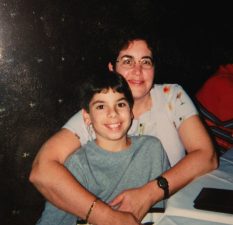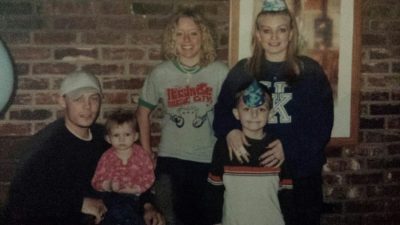Family Animals
Rattled: The Recklessness of Loving a Dog
I believe that loving a dog is basically mortgaging future heartbreak against a decade or so of camaraderie—I’d understood this when I got Red. But when confronted with it, I felt shamefully angry at myself for even getting him.
In the woods these last five years my border collie Red has eaten parts of dead pheasants and crows and gnawed the bleached bones of animals big and small. Over and over again he has rolled in shit, forcing me to wrangle and dunk him in the nearest creek like a Pentecostal preacher. Once he squirmed into the ribcage of desiccated deer and twice he has been sprayed by skunks. He smelled for months, a pale yellow stain on his white chest and a sour reek coming off him when wet. Even on his best days, he tracks in briars and seedpods. He tracks in ticks and fleas. He tracks in dirt that somehow finds its way under the covers. Because of Red, sometimes I sleep in grit.
As long as Red can roll, Red will roll in shit. As long as he can chase, he’ll chase rabbits and deer. This, more than anything, is what I like about him. And it’s the same intractability that brought Red my way in the first place. I adopted him from a sheep farm after he killed a few lambs by running them in circles until they dropped dead from exhaustion. His herding drive was too strong. He couldn’t do the thing he was meant to do—genetics and training all muddled up inside him. At the time I thought it was very poetic. My family always just had golden retrievers, dogs with the dogginess bred out of them. Red’s owners gave me a bag of K-Mart dog food and fifty bucks for taking him.
When I adopted Red I was twenty-four years old, a real fuck-off, committed only to working as little as possible and spending my free time outside. At the time, I was doing nothing but odd jobs and farm work for cash, and Red came along most days. We lived above a garage full of junk musical instruments I pretended to play, and drove a Chevy Blazer the same age as me. But life has that way of hammering the edges round. Eventually I needed health insurance so I got a real job. Then a better job. Then graduate school. We moved to a college town that always smells like burnt pizza. I bought a few nice shirts and, for Red, little dog socks to protect his paws from the winter rock salt. On the weekends in that town, there’s vomit on the sidewalk and Red tries to eat it.
Now that I’m nearing thirty, now that I have a messenger bag and brown leather shoes, I spend my weekends learning to fly-fish. Red likes it a lot. We drive down wide highways and shoestring roads to small backcountry tributaries of the Savage River in Garrett County, Maryland. These are steep creeks that flop over themselves—plunge pool after plunge pool after plunge pool—from the hilltops down to the confluence. Some are so narrow you could almost jump across. Small, speckled brook trout live and die there. The trout don’t get very big, the walking is tough, and the dense canopy makes it hard to cast a fly. Most people prefer to chase the big fish that live in the river. But we stick to little streams because I can be alone and because they flow away from roads, offering Red safe space to run.
It’s spring, a Wednesday I’ve stolen from the boring ambitious part of myself. I’m fishing a tributary of the Savage, inching backward upstream on a cutbank, swinging an olive wooly bugger through some riffles and catching nothing. Two drooping branches hide a shady pool where I am sure some brookies hide. The water runs high, spring sun trying to warm the damp woods. I move quiet and slow through the low brush to find the right spot. Only the sounds of the stream and the breeze, and the rattle—the familiar sound that’s made when the end of the fly line vibrates against the rod. But it grows louder. On the water my fly line bellies in the current. Rattle. A hot fear bubbles through the marrow of my bones.
The rest happens neither quick nor slow. It happens outside of the normal cadence of time, like when you’re asleep or very drunk. Near my ankles a mayapple bush trembles. Red runs through the cinnamon ferns towards me, tongue lolling and ears perked to the sound. I do not jump as much as spring, spinning on impulse to face it. The sound becomes a thing and the thing lunges through the underbrush at my dog, my dog who has inadvertently saved me. Red jolts backward. Nothing is clear in the brush. Is he bit, was he bit? Do I have Benadryl, cell phone service, a canine snakebite kit? No, not a goddamn thing.
It’s a big dastardly rattlesnake striped black and brown. Its rattle thrums, its forked tongue tastes the air. It recoils into its concentric loops, loading to spring again. Red cants his head and bounces side-to-side, startled and dumb.
“Red, Get! Sit! Lay Down!” I holler, jumping back. I swing my rod at Red, the line whipping from the eddying stream as it arcs through the trees, the rod tip barely clipping Red on the muzzle, at which he jumps backward. Just enough for me to grab him by the scruff. The snake slithers away, as big around as my wrist and four feet long. Sinister-looking, alien and unknowable.
I hustle Red back to the trail and upend him in the dust to check for a bite. I’ve always worried about snakes and have read enough to know that the site of the bite isn’t always apparent right away. His fur is too thick to see anything. Why is the fur so goddamned thick? Is there a bite below the fur? To slow blood flow he has to stay calm. We both do. At first, I try to carry him but it makes him so nervous he kicks his little legs as if he could swim through the air away from me. So we walk. He keeps trying to stop and mark his territory. I am convinced I saw the snake bite the dog, fangs piercing fluffy chest. He’s been bit, so he’s poisoned. Hemotoxins turning his blood into goop. Into sludge. The useless sludge hardening up his fast-beating heart. Swelling, slowing, turning him into this-dog-I-once-had. A dead dog. I’ll have to drive home with a dead dog.
At the trailhead, I put Red in the front seat of the car so I can monitor him and drive too fast toward cell phone service to call the vet, winding through gears, almost clipping a deer, sending gravel skittering at every corner. We’re an hour’s drive from home—the middle of fucking nowhere. If he’s not acting odd he probably wasn’t bit. This I know. But still my heart pounds its fists on the wall. Still I make arrangements. Where to bury him? How much is cremation? How did how I let this happen?
Leaving the state forest for the highway, we pass two red fox kits in the ditch on the roadside. Fluffy and fat and too young to be away from the den. Their mother’s probably dead and they will be soon too. Most wild foxes are dead within their first year, I remember reading long ago. Red lounges in the front seat and acquaints himself with the air conditioner, my hand on his neck as if I know how to check his pulse. An ambulance passes on the other side of the highway and I think of the huge dead trout I had noticed decomposing in an eddy earlier that day and another I’d accidentally foul-hooked and killed that spring. Then the sinewy spinal column of a deer that Red had dragged into the house on my birthday a couple years back when we still lived in the country. And the time he brought me a box turtle from the backyard and dropped it at my feet, expecting me to throw it like a tennis ball. The times he’d bolted during thunderstorms and I drove slowly down back roads, expecting to find his struck body in the ditch at every turn.
Later, the vet says Red’s probably fine and says to monitor him for swelling. At home, I comb through Red’s soft chestnut fur, pick a few dog ticks from his skin, and squeeze each one in a tissue until his blood explodes from their swollen bodies. Then we sit together on the futon and I try to do some reading. Red flops a slobbery paw onto my library book, like he always does, as if to say, “No. Me.” I think, yeah, Red. You .
*
When you think you’re at the end of something, your thoughts go to the beginning. I believe that loving a dog is basically mortgaging future heartbreak against a decade or so of camaraderie—I’d understood this when I got Red. But when confronted with it, I felt shamefully angry at myself for even getting him. The man I’d become wouldn’t adopt a skittish little shit like Red, wouldn’t deal with the dirt in the bed or the way he clawed the doorframes during storms. It hit me then how safe I’d become. How different. Red ate organic dog food and took daily joint-health supplements and went to the vet every time he so much as stood up too slow.
But still, there was a snake, patterned like a pile of leaves. Right there in the ferns.
I keep him close all that night and soon it becomes clear that Red is okay. I should have known, but I let the fear get a hold of me. Fear of loss, of failing, of letting him die. Those deep guttural fears. As impossible to reconcile as explaining thunder to a dog. Even after I know he wasn’t bit they churned in me. That rattle. Raw as death, close as a secret. But soon a hot and dry summer comes. The creeks slow, like always, and the fishing turns off. Red and I spend a lot of time hiking and for the next few months I try to keep him leashed, close to my hip. I listen to the woods so hard that there is no such thing as silence. When we walk over sun-warmed rocks, I clap to tell all the unseen snakes we’re here.







